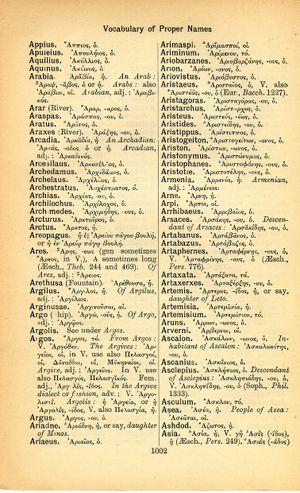Arabia: Difference between revisions
Ῥᾴθυμος ἐὰν ᾖς, πλούσιος πένης ἔσῃ → Si dives es pigerque, mox iners eris → Dein Leichtsinn macht alsbald dich arm, seist du auch reich
(Gf-D_1) |
m (Text replacement - "}}]]" to "}}]]") |
||
| Line 1: | Line 1: | ||
{{WoodhouseENELnames | {{WoodhouseENELnames | ||
|Text=[[File:woodhouse_1002.jpg|thumb | |Text=[[File:woodhouse_1002.jpg|thumb | ||
|link={{filepath:woodhouse_1002.jpg | |link={{filepath:woodhouse_1002.jpg}}]]Ἀραβία, ἡ. | ||
<b class="b2">An Arab</b>: [[Ἄραψ]], -αβος, ὁ or ἡ. | <b class="b2">An Arab</b>: [[Ἄραψ]], -αβος, ὁ or ἡ. | ||
Revision as of 10:09, 15 August 2017
English > Greek (Woodhouse)
Ἀραβία, ἡ.
An Arab: Ἄραψ, -αβος, ὁ or ἡ.
Arabs: also Ἀράβιοι, οἱ.
Arabian, adj.: Ἀραβικός.
Latin > English (Lewis & Short)
Ā̆răbĭa: (on account of the long A in Prop. 3, 10, 16, erroneously written by many Arrabia; cf. Jahn ad Hor. C. 3, 4, 9), ae, f., = Ἀραβία.
I In an extended sense, the country Arabia, divided by the ancients into Petrœa (from its principal city, Petra), Deserta, and Felix, Plin. 5, 11, 12, § 65; Mel. 1, 10; Vulg. 3 Reg. 10, 15; ib. Gal. 4, 25 al.—
II In a more restricted sense, a town in Arabia Felix, Mel. 3, 8, 7. —Hence, Ā̆răbĭcus, a, um, adj., Arabic, Arabian: odor (i. e. tus), Plaut. Mil. 2, 5, 2: sinus, Plin. 2, 67, 67, § 168; Mel. 3, 8, 1: resina, Plin. 14, 20, 25, § 122: adamas, id. 37, 4, 15, § 56: alites, id. 37, 10, 54, § 146: balanus, id. 12, 21, 46, § 102: lapicidinae, i. e. of alabaster, id. 36, 12, 17, § 78: spina, the acacia, id. 24, 12, 65, § 107: vectis, Curt. 7, 2. 17. —Absol.: Ā̆răbĭca, ae, f. (sc. gemma), a precious stone, similar to ivory, perh. a kind of chalcedony or onyx, Plin. 37, 10, 54, § 145; Isid. Orig. 16, 14.—Ā̆răbĭcē, adv.: facite olant aedes Arabice, make the apartments redolent with the perfumes of Araby (frankincense, which was brought from Arabia), Plaut. ap. Diom. p. 378 P. (Arabice olet, id est ex odoribus Arabicis, Fest. p. 23): Arabice sacri vocantur, in Arabic, Sol. c. 33.
Latin > French (Gaffiot 2016)
Ărăbĭa,¹⁴ æ, f., l’Arabie : Plin. 5, 65 ; Cic. Att. 9, 11, 4 || -bĭus Prop. 1, 14, 19 , Plin., -bĭcus Curt., Plin., -bĭānus, a, um, Spart. Sev. 13, 7, d’Arabie || -bĭca, æ, f., pierre précieuse : Plin. 37, 145 || -bĭcē, adv. : arabice olere Pl. d. Diom. 383, 16, sentir les parfums d’Arabie, cf. P. Fest. 28, 10.

